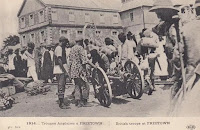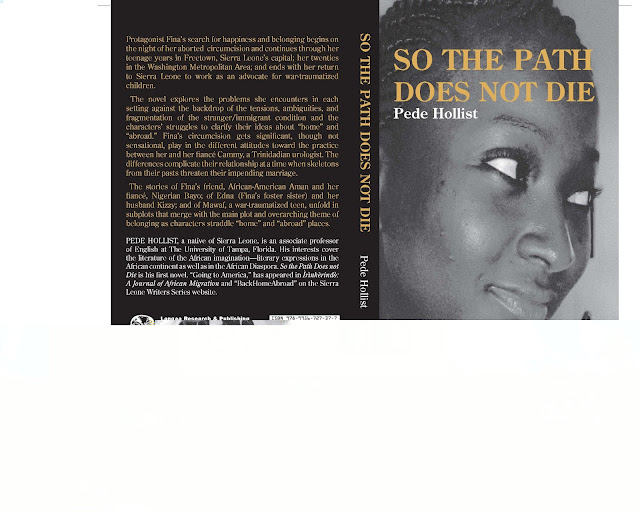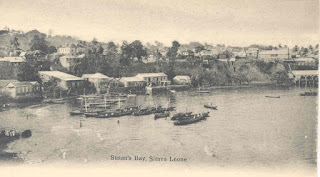"For it is all that is left after war. The story outlasts us, it outlasts us all" - Sierra Leoneans Celebrate Chinua Achebe's Stories
How
do you celebrate the 86th birthday of a man who wrote the most
widely read book in African literature? Host a hangout “across computers, Android, and Apple devices“ on a WhatsApp
group.
The Sierra Leone Writers Series group, which marked its second birthday November 14, connects poets, novelists, writers, performance artists, painters, playwrights, and musicians of Sierra Leonean descent.
The Sierra Leone Writers Series group, which marked its second birthday November 14, connects poets, novelists, writers, performance artists, painters, playwrights, and musicians of Sierra Leonean descent.
Joining in were Njanguma Momodu, who has set up a writers forum that launched a public library in rural Sierra Leone; freelance writer and radio host Khadi Mansaray, and Sheriff Mohamed, who writes short stories, novellas and drama for radio TV and stage. Vitabu’s Lango Deen moderated the hangout. Below are excerpts from the group.
Kemurl:
Do we remember this excerpt from Chinua Achebe's masterpiece, Things Fall Apart?
"The white man is very clever. He came quietly and peaceably with his religion. We were amused at his foolishness and allowed him to stay. Now he has won our brothers, and our clans can no longer act like one. He has put a knife on the things that held us together and we have fallen apart."
Such brilliant writing that stunned the world of literature.
I vividly recall when I first held that book. I could barely understand English
or read the lines that seemed so perfectly arranged [so] I looked at the
pictures in the book.
I could see the lines on Okonkwo's face. He seemed angry, especially at the men with fancy outfits and a cap designed like a bowl, fitted with broad edges to make it not fit to eat from. At that time I was young, uneducated and in distress because of a senseless civil war that was mercilessly [ravaging] my country.
I could see the lines on Okonkwo's face. He seemed angry, especially at the men with fancy outfits and a cap designed like a bowl, fitted with broad edges to make it not fit to eat from. At that time I was young, uneducated and in distress because of a senseless civil war that was mercilessly [ravaging] my country.
Despite my "uneducated-ness," my
"young-ness" and the blast of gunfire, Things Fall Apart spoke to me
and I listened. When I came of age, the message was dwelling in me so I just
reached out to the words and embraced them.
But I embrace these lines more:
"A man who calls his kinsmen to a feast does not do so to save them from starving. They all have food in their own homes. When we gather together in the moonlit village ground it is not because of the moon. Every man can see it in his own compound. We come together because it is good for kinsmen to do so."
16 November would've been Professor Achebe's birthday, but he has gone to meet our ancestors. So we say, rest well our dear elder. May the good Lord light your path.
Njanguma: I read Achebe's Chike and the River in primary school. Then in secondary school, I discovered Things Fall Apart. Being what "town” people usually call “kontri” (country) I related to Achebe's story a lot.
The Trilogy decided my fate, and I vowed then that I must do all
it takes to write like Achebe. That pledge is still on.
Khadi: I first came across Achebe at school with Chike and the River then I slumbered. Later, as an adult, I rediscovered and had an intense love affair where I read the Things Fall Apart trilogy and had some pretty good discussions on Vitabu. I eventually outgrew Vitabu but am still in love with the man.
Khadi: I first came across Achebe at school with Chike and the River then I slumbered. Later, as an adult, I rediscovered and had an intense love affair where I read the Things Fall Apart trilogy and had some pretty good discussions on Vitabu. I eventually outgrew Vitabu but am still in love with the man.
Still haven’t read There Was A Country. I'll get round to it when I finish reading Gibs’s ("This Side of Nothingness”).
Lango: Like {Kermul]
I’d heard of Achebe but don’t recall coming across an Achebe book until much
later. I had older cousins, who subscribed to DRUM magazine, which I always
thought came out of Nigeria. I found out
it was published in South Africa. In one issue, one of the characters mentioned
Achebe and my cousins discussed that for some time. A few years later, they were helping me buy
books on my booklist for the school year and there was Achebe! I've been
reading him since 1973. Titles such as Chike
and the River, How the Leopard Got His Claws, Beware, Soul Brother, and
Other Poems, and the Trilogy.
Kermul: I didn't
get the chance to read Chike and the River but I looked at the pictures. I lost
interest in reading when the war ended. The struggle to redefine myself made
sure of that, so I was fond of pictures.
When I could finally read again, “Kamara
family” and the likes were all over.
Chike and other works of Achebe were nowhere to be seen, with the
exception of Things Fall Apart that I'd long wanted to read.
M. Gibril: I read
his collection of essays. Quite impressive, great insights on diverse issues
around literature. It's a shame he wasn't awarded the Nobel Prize like Soyinka.
M. Sheriff: Indeed. His is one of the collections I always remember vividly.
M. Sheriff: Indeed. His is one of the collections I always remember vividly.
M Gibril: Achebe
is like no other. I like his Arrow of God and his characterization of the
stubborn and impulsive priest, Ezeulu. His Things Fall Apart is an African
classic.
But I love more than all, his last novel, Anthills of the Savannah, and especially a prose poem therein, and a lecture by one of his characters on "Meditations on the Theme of the Struggle" that contains within it the poignant tale of the leopard and the tortoise — a tale of approaches to the struggle by the weak and oppressed.
But I love more than all, his last novel, Anthills of the Savannah, and especially a prose poem therein, and a lecture by one of his characters on "Meditations on the Theme of the Struggle" that contains within it the poignant tale of the leopard and the tortoise — a tale of approaches to the struggle by the weak and oppressed.
 But you should read his book of essays, “Of Hopes and
Impediments” and the insight therein of being earnest in telling our stories
multi-dimensionally— hooking them to a narrative frame that celebrates the full
measure of our humanity, the very good, the good and the not so good.
But you should read his book of essays, “Of Hopes and
Impediments” and the insight therein of being earnest in telling our stories
multi-dimensionally— hooking them to a narrative frame that celebrates the full
measure of our humanity, the very good, the good and the not so good. But alas, the Conradian caricature is alive amongst us, a caricature of the continent as a place of evil and disease and so many other primitive appellations. You see this narrative being stoked unquestionably.
Achebe was a great sage, he fought against these caricatures; hope our writings are informed by his wisdom.
And I liked his depictions of art. I think it was about
something called Mbaru. How every
generation must create its own art and ensure its partial destruction to ensure
the birth of the art of the next generation. Perhaps the word 'destruction' above is too harsh; so let me replace it with
'emerge'.
Emerge with new depictions, new ways of telling it, including putting
new statues amongst the pantheons.





Comments
Post a Comment